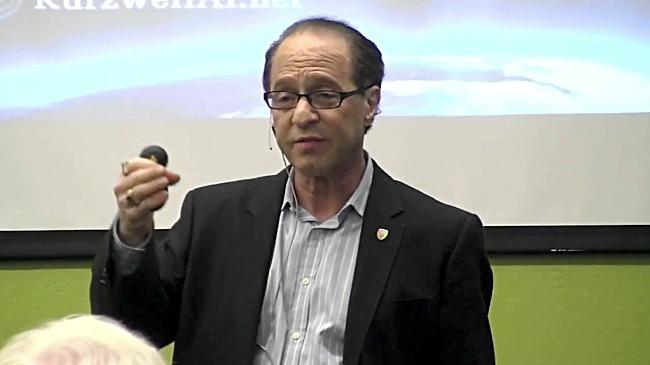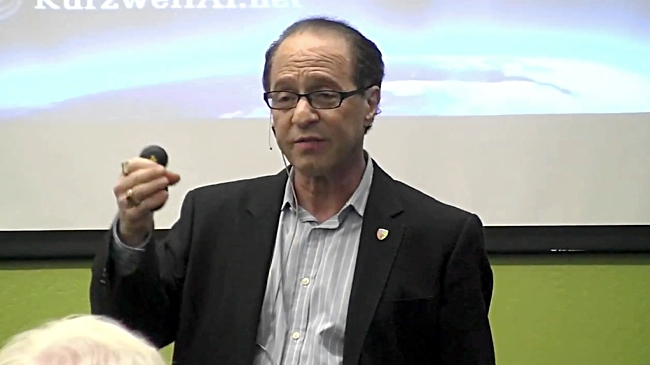
 Kurzweil at Google
Kurzweil at Google
Google recently appointed Ray Kurzweil as its Director of Engineering. People get new jobs all the time, but this is different, and it might just be the biggest tech story of the year, with profound implications for our own industry, and quite possibly every other one too
Ray Kurzweil is no stranger to the broadcast and content creation business. He gave a keynote address to the 2010 NAB convention and accurately described the changes in technology that are affecting our industry: exponential growth in the capabilities of technology which allows us to work together and create in ways that we could only have imagined (or not imagined, which is more often the case) only a few years ago.
Kurzweil has a CV that defines him as an inventor and innovator. Speech synthesis, text-to-speech, sampling keyboards (the Kurzweil 250 was seen on stage at the Philadelphia leg of Live Aid, during Madonna's set) and, latterly, a string of books (like "The Singularity is Near") that start with reality, and end with what looks like fantasy, but will probably turn into actuality if Kurzweil's uncanny record of predicting future technological trends is maintained.
Prophesies
You can see Kurzweil's prophesies turning into hard, scientific fact all over the place. Note that the next stage in high resolution television is not just a bit better (say, 25%) but four times better. And the stage after that? Sixteen times better than what we are used to now.
Of course, there's much more to it than these examples. And the idea of the Singularity wasn't Kurzweil's alone, but he has probably popularised the idea more than anyone before him.
What's the singularity? There are several ways to look at it, all intertwined in connected consequences.
Singularity
On the one hand (and this is the way I prefer to look at it - because it is the easiest way to grasp it) it is the point in time when the speed of technological progress, as a graph with progress on the y axis, looks vertical from our viewpoint. When this happens, anything could happen. New and astonishing technical breakthroughs occur without warning. We don't see them coming.
The other way to look at is the way that technology enhances - and possibly eventually supplants - intelligence. Without being too picky about what intelligence actually is at this stage, it is perhaps fair to say that technology is able to enhance our cognitive abilities in the same way that a pair of spectacles helps us to see. You can only wonder what it would be like to have a browser (complete with Google, Facebook, Wikipedia, Skype etc) connected directly to our brains rather than to our mouse and keyboard or touch screens - and to have limitless cloud-based processing on-tap.
This type of singularity is reached when machines become more intelligent than us.
What happens then is anyone's guess, but at least one possible outcome is that our mind/machines create complex systems that are even more powerful, setting up a virtuous circle that quickly passes the point where a single computer (whatever that will mean in the future) will have more brainpower than all the (biological) intelligence in the galaxy.
All of this might seem to be a long way off. Intuitively, it feels like centuries, if not thousands of years.
But not according to Kurzweil.
In our lifetime?
Many of us can expect to see the singularity in our lifetime. So we'll soon know whether this was wild speculation or not.
Some of Kurzweil's imaginings seem like pure fantasy. The further ahead he looks the more you have to question his predictions. But that's OK, because if in the next century we're going to see the equivalent of the previous twenty thousand years-worth of progress, then it's very hard to say that someone is simply flat-out wrong.
Kurzweil's new book, How to Create a Mind, has been criticised both as unoriginal and inaccurate, largely on the grounds that Kurzweil is not a neuroscientist; but for lay-people, there may be genuine insights into how the brain works, and, surely, since the brain is often held to be analogous to at least some types of computing devices, there is value in reading about brain function from the perspective of an expert in practical computer intelligence.
The future of video technology
Understanding how the brain works, especially the cognitive side of it, is essential to future video technology. We will probably continue to improve compression technology (more by virtue of increased computing power rather than better mathematics) but at some point we may leap from watching video on screens to perceiving content directly. It's impossible at this stage to say how we will do this because so much depends on what kind of machine-brain interfaces emerge - but when we do achieve this breakthrough, the key to making it work will be understanding the deep mechanisms by which we perceive moving images, not through our eyes, but through our deep cognitive systems.
And at that point, we might have some interesting choices in how we format video for direct-to-brain delivery. The more we know about how it works, the better we will be able to do this.
Just look at MP3
And even before we reach that point, it is essential to know more about our brain mechanisms. MP3 is a good example of how we use our sense of hearing's "masking" characteristics to reduce the complexity of an auto signal without massive detriment to the quality of the sound as we perceive it.
Why is Kurzweil's Google appointment so important?
It's important because no-one understands computing on a massive scale better than Google. Nor does anyone have more knowledge about how people behave with respect to data about them.
And no-one has more advanced and, I believe, plausible and evidence-based knowledge of computer "intelligence" than Kurzweil.
I think the two needed each other.
Tags: Technology


Comments